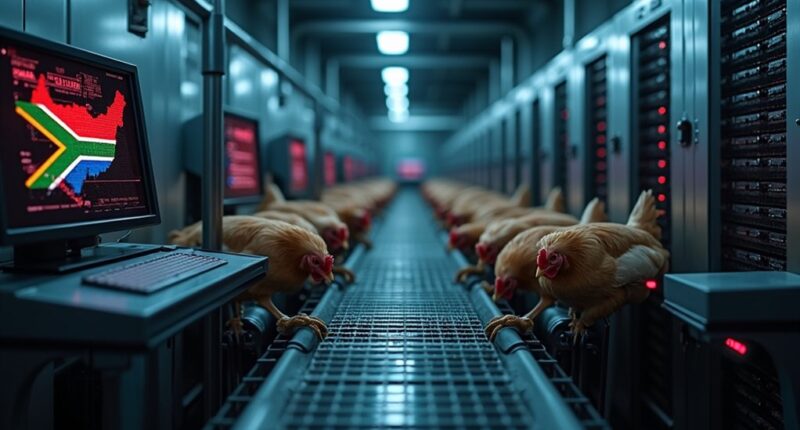Hackers struck Astral Foods on March 16, leaving the South African poultry giant scrambling to recover. The cyber intrusion hit the company’s poultry division hard, grinding processing to a halt and delaying deliveries. Just what the struggling industry needed – another crisis to deal with.
The attack couldn’t have come at a worse time. Astral was already grappling with lower chicken prices due to weak consumer spending and rising feed costs from the 2024 drought. Talk about kicking a chicken while it’s down. The company’s systems eventually recovered, but not before causing an estimated R20 million ($1.1 million) in financial damage. With the global cybersecurity market valued at 145 billion dollars, incidents like this demonstrate why protecting agricultural technology systems is becoming increasingly critical.
Operations are back to normal now, thankfully. Astral implemented disaster recovery protocols quickly and managed to protect confidential information. No sensitive data compromised – a small victory in an otherwise miserable situation. The company has since encouraged users to visit their FAQs section for updates on service restoration.
The financial outlook isn’t pretty. Half-year profits could plummet by up to 60%. Earnings per share are projected to drop to 415 cents from 923 cents, while headline earnings could fall to 354 cents from 884 cents. Shareholders won’t be throwing any celebration parties anytime soon. Small businesses are particularly vulnerable, with 60% shutting down within six months following a cyber attack, highlighting the severity of such incidents.
This incident highlights a growing problem in agriculture. As farms and food processors go digital, cybercriminals are licking their chops. The sector has historically focused on performance and safety, not digital security. Big mistake.
Common threats include ransomware, phishing attempts, and supply chain attacks. Even IoT devices in smart farming systems are vulnerable. Cybercriminals don’t discriminate – if there’s money to be made, they’ll target it.
Despite all this doom and gloom, Astral has maintained its net cash position. Small consolation when you’re dealing with extensive retail promotions driving down frozen poultry prices and broiler net margins under pressure.
The attack on Astral serves as a harsh reminder: no industry is immune from cyber threats. Even chicken farmers need firewalls now. Welcome to 2025, where your computer viruses can literally affect your food supply.









